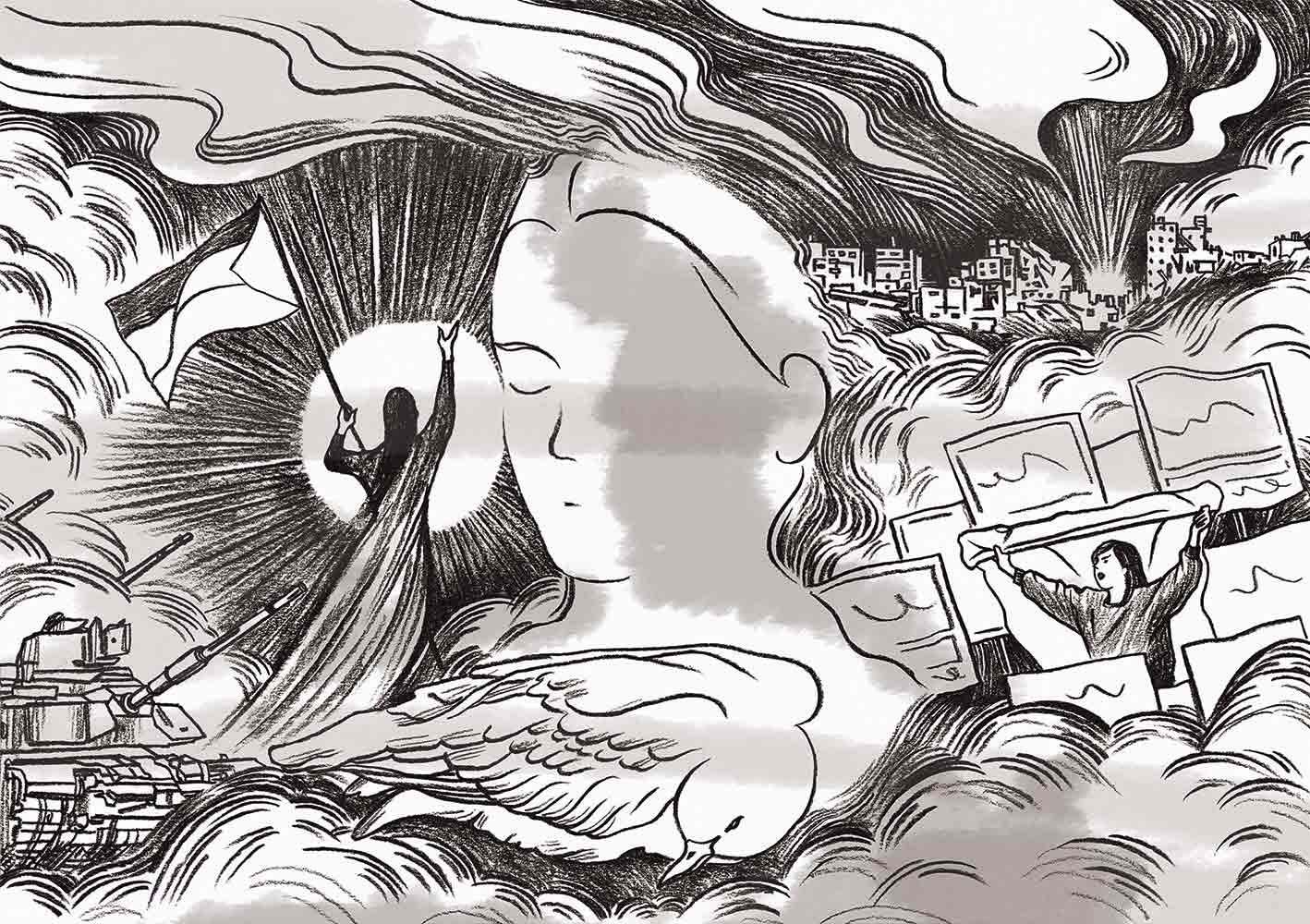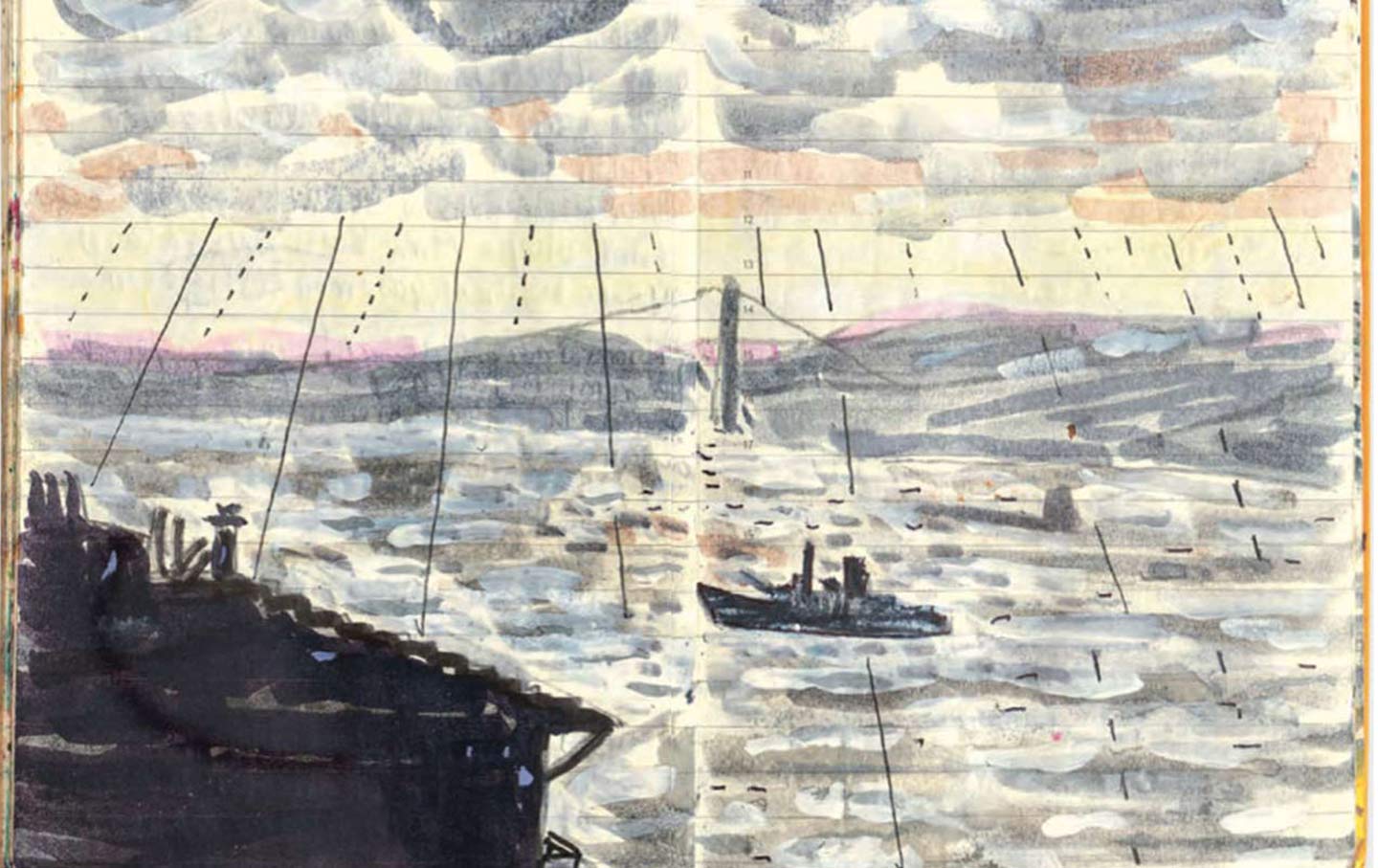Between Victory and Defeat
How can the left escape burnout?
A Left Between Victory and Defeat
How can the left escape burning out?

On December 22, 1897, Sigmund Freud wrote to his friend and confidant Wilhelm Fliess about a patient who had suffered a grisly family nightmare. Her father, Freud writes in his startling, matter-of-fact way, “belongs to the category of men who stab women, for whom blood injuries are an erotic need.” Among his many heinous actions was raping his daughter and infecting her with a venereal disease. Perhaps, Freud offers, psychoanalysis needs to embrace a somber “new motto”: “What have they done to you, poor child?”
Books in review
Burnout: The Emotional Experience of Political Defeat
Buy this bookWas hat man dir, du armes Kind, getan? The line is Goethe’s, sung by the androgynous circus girl Mignon in Wilhelm Meister’s Apprenticeship. It’s a poignant and simple summation of the Freudian enterprise: The analyst invites the patient to speak of their suffering and then listens. (It was likely not lost on Freud either that Mignon is the product of incest, or that Wilhelm’s feelings toward her cycle through those of the father, the protector, and the lover.) But Freud’s new motto was short-lived; in a matter of years, he went from believing that his patients were suffering from repressed memories of actual childhood sexual abuse (“I find it’s the closest relatives, fathers or brothers, who are the guilty men,” he wrote in April 1897) to believing their memories of “infantile seduction” were imagined: incestual fantasies. Thus, as Jeffrey Masson later charged, Freud shifted his emphasis “from a real world of sadness, misery and cruelty, to an internal stage on which actors performed invented dramas for an invisible audience of their own creation.”
Masson, who shepherded the Fliess letters to publication, was obsessed with discrediting his onetime hero; he was not Freud’s most charitable chronicler. It is difficult today to regret Freud’s turn away from the seduction theory and toward dreams and fantasy, the materials from which he derived his most luminous insights. But there is a kernel of bitter truth in Masson’s charge: After the oedipal turn, the reality of an unjust and wounding social order, especially for women, became a muted factor in Freud’s etiology of mental anguish. It is not an objectively cruel world that causes us to suffer, he concluded, but our failure to adapt to it successfully. The empirical question—what have they done to you, poor child?—then becomes almost beside the point. It is not what really happened that matters, or who or what is responsible. We may remain, in some sense, poor and broken children, but with less recourse to blame and to adjudication. Therapy is a matter of accommodating ourselves to this lack of real reparation. Mental health becomes the handmaiden of social stasis; madness, the provenance of would-be revolutionaries.
This antinomy between the psychic and the social—and the ways leftist radicals have variously sought to resolve it—is the starting point of Hannah Proctor’s provocative new book, Burnout: The Emotional Experience of Political Defeat. Proctor, a research fellow at the University of Strathclyde in Glasgow, is not a partisan of the anti-psychiatry movement, which from the 1960s onward has depicted all extant mental health interventions as ideological disciplining. Nor does she wish to reify the dichotomy between internal and external sources of psychic pain. After all, she writes, “The ‘outside’ is a social world populated by other people, each with their own inner lives, each shaped by their past experiences in that social world, which they also participate in shaping.” Instead, Proctor is preoccupied with less abstract questions, at once more prosaic and more pressing: How can left-wing radicals simultaneously devise strategies for healing the wounds inflicted by a wounding world while also seeking to eradicate the social structures that wound us in the first place? And what can we do with ourselves when, inevitably, we are exhausted, physically and emotionally, by these efforts—and their failure?
More Spring Books
-
Nell Irvin Painter’s Chronicles of Freedom
-
Keith Haring and the Downtown Art Revolution
-
Vinson Cunningham’s Searching Novel of Faith and Politics
-
Leslie Jamison and the Travails of Millennial Divorce
-
Gabriel García Márquez’s Last Lesson
-
A Left Between Victory and Defeat
-
The Radical World-making of Joanna Russ
Anyone who has insisted to a therapist that their depression or anxiety is principally the product of, say, capitalism, racism, or transmisogyny and then felt a sinking feeling as the therapist—ever kind, ever gentle—pulls the conversation back to family dynamics or toward a diagnosis (“Shall we up your medication?”) has experienced a version of the double bind that Proctor identifies. In the worst circumstances, the patient comes to feel that her desire to change the world, her simmering hope that it can be done, is the obstacle to her well-being, the thing being pathologized. And perhaps it should be. In a very real sense, to be committed to changing the world on a revolutionary scale is, for better and worse, a form of insanity. Your therapist is right: You are a social deviant, a hopeful freak, a heretic. And your burning desire to change the world is making you suffer, contributing to your feelings of alienation and even your actual ostracization. As Cornel West once said of radical Christian socialism: “A follower of Jesus is somebody who is on fire with a love that makes no sense through the lens of the world.” To be on fire is to be a danger to yourself and others. Out of care for you—or fear of you—the world wants desperately to douse the flames.
And that is often what happens: to burn brightly with radical desire and conviction is always to risk becoming burned-out. And this state of diminishment, finally, is Proctor’s principal subject. Radicals, she suggests, are not merely those who fight to make the world less wounding; they are those who become wounded in the process—and who must find ways to heal each other in order to keep on fighting. Fugitive moments of unfurled promise, and the pleasure we take in each other, can only sustain us for so long before the eventual denouement. Our emotional lives, Proctor writes, assume a predictable shape: “An original feeling of joy, followed by the curdling of hope, animosity emerging between comrades, the emotional numbness produced by prolonged political engagement, the shrinking of possibility.” The brief solidarity we may find in moments of shared disappointment is thin gruel indeed; soon we begin to resent one another for reminding us of our formerly hopeful selves. As the poet Anna Mendelssohn puts it: “There was no nourishment for us in the world we were born to, and the initial fuel we had found in each other was burning out.”
Burnout is a book about the psychic life of radical movements; it is also a book about defeat—because that is the primary psychic experience of the radical life. Losing, for revolutionaries, is more often the norm than the exception. As Marxists say, every generation of militants is doomed to fail, save the last. Thus, Proctor’s short chapters are dedicated to the negative affects that haunt the revolutionary endeavor: melancholia, nostalgia, depression, exhaustion, bitterness, and mourning, among others. In each, she relies on “secondary histories, memoirs, novels, films, as well as works by psychiatrists, psychologists and psychoanalysts” to illustrate how a sense of doom and disappointment has shaped the psychic lives of left-wing radicals from the Paris Commune to the Black freedom struggle to Italian ‘68ers, Guatemalan guerrillas, and the AIDS activists of ACT UP.
Proctor’s approach to her material, she admits, is “intensive rather than extensive, microscopic rather than synoptic, fragmentary rather than synthetic.” She mobilizes an exciting breadth and variety of reference—Che Guevara’s Congo diaries, pamphlets by communist therapy groups, the novels of Neel Mukherjee and Toni Cade Bambara, the films of Patricio Guzmán—but only rarely lingers long enough with any single artifact to draw out all its contradictions.
An exception is her treatment of Bambara’s novel The Salt Eaters. Set “in the fragmented aftermath of the movements of the sixties,” Proctor writes, the novel “captures the durational, ongoing nature of political struggle and the way political commitments become enmeshed with the quotidian churn of daily life.” Its protagonist, Velma, is burned-out—depressed and suicidal—after years of dedication to civil rights and feminism. In a state of desperation, she goes to Minnie, a healer, for help. After hearing her story, Minnie asks, “Are you sure, sweetheart, that you want to be well?” The question, Proctor writes, “suggests there is some consolation or comfort to be found in being wounded, angry, hurt, broken,” that there is something to be lost in being healed. In relinquishing her wounds, Velma fears losing herself: the hard-won, militant self, who fights from a sense of injury.
Radical politics are shot through with these contradictory impulses. Like Velma, one must be sensitive, capable of being wounded by the world, to be drawn to radical politics in the first place. That is to say, one must be gentle—perhaps too gentle. Later, however, what the movement demands is not gentleness but resilience, hardness even. “We must grow tough,” Che is supposed to have said, “but without ever losing our tenderness.” Yet that is easier said than done. As Proctor’s epigraph from Brecht puts it: “Hatred, even of meanness / Makes you ugly. / Anger, even at injustice / Makes your voice hoarse.”
And yet, at times, it is only by remaining wounded—and not only by injustice but by the movement itself—that we manage to remain attached and committed to the struggle. Our loyalty to a cause becomes bound up with the wounds it produces. To be healed and whole is to lose our militancy, our mad and maddening thirst for justice. Are you sure, sweetheart, that you want to be well? No, we are not so sure. “Take away the miseries and you take away some folks’ reason for living,” Minnie notes.
But can wounded attachment be a reliable basis for revolutionary commitment and continued participation in politics? Another self-cure for burnout—one I have observed in myself and others—is replacing one’s anger at the world with anger at the movement for failing to change it. As an embittered civil rights organizer told psychiatrist Robert Coles in the early 1960s, “I feel I’ve lost those years. They’ve come to nothing…. So I feel betrayed by the movement, and I guess it’s easier to get angry at it than at the white world.” “My hate for the movement,” the organizer added, “is a release…. I can hate it and do something about it. You know, attack them and undermine them. But what can a Negro do to the white world without getting destroyed eventually.” It’s safer perhaps—healthier even—to hate the movement than to go on hating the world. When despair and exhaustion set in, the movement becomes a surrogate object of resentment. As with anything that sustains us, love can easily turn to hate; that which once nourished our hope poisons us instead.
Instead of hate, though, some also find (cold) comfort in melancholia. Proctor cites Wendy Brown’s withering critique from 1999 of how the left can sometimes become “more attached to its impossibility than to its potential fruitfulness, a Left that is most at home dwelling not in hopefulness but in its own marginality and failure, a Left that is thus caught in a structure of melancholic attachment to a certain strain of its own dead past, whose spirit is ghostly, whose structure of desire is backward looking and punishing.” As Proctor beautifully summarizes, for the left melancholic, “loss itself becomes the lost object…. Ossified grief becomes a permanent political disposition.”
Bitterness and melancholy are set against another disposition that Proctor explores in Burnout: mourning, which, she argues, can transmute despair into new founts of political action. The irony of Joe Hill’s dying admonition—“Don’t waste any time mourning—organize!”—was always that his friends did not just do the latter; they did both. Memorializing him as a martyr, they bound themselves, and generations to come, to the cause for which he gave his life. If recent history is any indication, the failure to mourn is just as likely to demobilize a movement. The social democratic demands of the Bernie Sanders movement have survived, but it’s not clear to me that the left ever fully reckoned with the staccato calamities of spring 2020, when the dream of a socialist presidency was killed just moments before a pandemic shut down all social life. That summer, the George Floyd uprisings offered a glimpse of what militant mourning might look like during a plague. But that, unfortunately, didn’t last either. Left politics since then has been more melancholic than mournful, more bitter about what might have been than clear-eyed about what was actually lost—and what, therefore, could still be won. As Proctor writes, there’s a difference between an empty heart (a melancholic attachment to absence) and a broken one (the pain of a loss that can, at least, be named). With time, care, and company, a broken heart can be mended.
In the book’s third chapter, Proctor movingly describes her own depression, which took hold in 2016, after a period of frantic engagement with left movements in London. It arrives suddenly, as if from nowhere, banishing past and present: “The future existed only as tomorrow, which functioned as an alibi for giving up on today.” She continues:
At the time it just felt like an unpleasant new texture accompanied my days, something like static on an old TV but duller, grittier and less electric. Every metaphor I can think of to describe the feeling falls apart in this way because everything I can think to compare it to sounds too vivid, too much like a tangible something, while comparing it to nothing sounds too dramatic and abyssal. Invoking the void would be way too interesting.
It is precisely the atemporality and formlessness of depression, its hostility to both narrative and metaphor, that makes it such an impossible position from which to do political work. To be committed to a more just and emancipatory society means having a sense of where one has been and where one is going. Radicals need to be able to describe what life will be like (if only metaphorically) when they arrive at their destination. In the worst cases of burnout, which become depressive, that sense of place and time is lost; we lose our orientation entirely. “Depression seems like it will never end,” my friend Matthew Sitman once wrote; “life becomes an eternal, excruciating present.”
Popular
“swipe left below to view more authors”Swipe →In Tribute to Freud, the poet H.D. recalls her analysis by the then-enfeebled doctor in the early 1930s. Entering his office at Berggasse 19, she sees his many Greek antiquities arrayed on a table and thinks of the same line from Goethe’s poem: Und Marmorbilder stehn und sehn mich an: / Was hat man dir, du armes Kind, getan? But H.D.’s translation is slightly different: not “What have they done?” but “What has happened?” It’s a subtle change, and perhaps a healthy one. The wounds inflicted on her by others are not all there is to her story; against the backdrop of trauma and history, what has happened is that H.D. has become herself.
In their sessions, H.D. recalls the First World War; she also observes what is happening outside Freud’s home, where there are swastikas in the streets and “confetti-like” paper tokens printed with the words “Hitler gives work” and “Hitler gives bread.” War is coming, about to intrude its violence from the past onto the present. “The years” between the wars, she writes, “seemed a period of waiting, of marking time.” For the politically naïve, “there was a growing feeling of stagnation, of lethargy”; for the politically astute, an “abstract clear-sightedness” that was as “muddled” and “lethargic” in its own way. No one person could change history alone. The wounded among her peers were too preoccupied with their pain; the unscathed, too indifferent to it. But in this recognition, H.D. at least saw clearly the contradictions of her own times: “Where is this taking you, I wanted to shout at both parties. One refused to admit the fact that the flood was coming—the other counted the nails and measured the planks with endless exact mathematical formulas, but didn’t seem to have the very least idea of how to put the Ark together.”
We are not today on the verge of world war. But climate change remains an emergency, reactionary forces are rising, and the world continues to look away as Israel undertakes an eliminationist war against the Palestinians. The post-Bernie left, meanwhile, is riven by divides similar to those H.D. diagnosed: Everyone seems either too ignorant or too knowing; too cautious or too daring; too blithe or too panicked; too young or too old. Proctor’s answer to H.D.’s quandary is a contradiction of her own: She recommends “patient urgency.” That is, she thinks we can imbue our urgency for change with patience for each other, our toughness with tenderness, our militancy with an obligation to care and be cared for. I certainly hope so. We aren’t poor children, but we once were, and all we’ve managed to become since then is flawed and fragile adults. We will keep on wounding each other and ourselves, and it’s probably best to be square on that. We may not win before it’s too late. But a left that pretends otherwise, which inflates itself with false certainty and bravado, will only be more lost when the air comes out. Perhaps by facing our feebleness, we can become strong. Perhaps by ceasing to disavow our grief, we can become whole.
More from The Nation

Can You Understand Ireland Through One Family’s Terrible Secret? Can You Understand Ireland Through One Family’s Terrible Secret?
In Missing Persons, Clair Wills's intimate story of institutionalized Irish women and children, shows how a family's history and a nation’s history run in parallel.

Peter Schjeldahl’s Pleasure Principle Peter Schjeldahl’s Pleasure Principle
His art criticism fixated on the narcissism of the entire enterprise. But over six decades, his work proved that a critic could be an artist too.

How the Western Literary Canon Made the World Worse How the Western Literary Canon Made the World Worse
A talk with Dionne Brand about her recent book, Salvage, which looks at how the classic texts of Anglo-American fiction helped abet the crimes of capitalism, colonialism, and more...

Along the Roads That Built Modern Brazil Along the Roads That Built Modern Brazil
José Henrique Bortoluci's What Is Mine tells the story of his country’s laborers, like his father, who built its infrastructure, and in turn its fractious politics.

The Long History of the "Elsewhere Museum" The Long History of the "Elsewhere Museum"
Can the ethnographic museum be reinvented?

Rain and Mountains Rain and Mountains
Pages from a novelist’s notebook.


